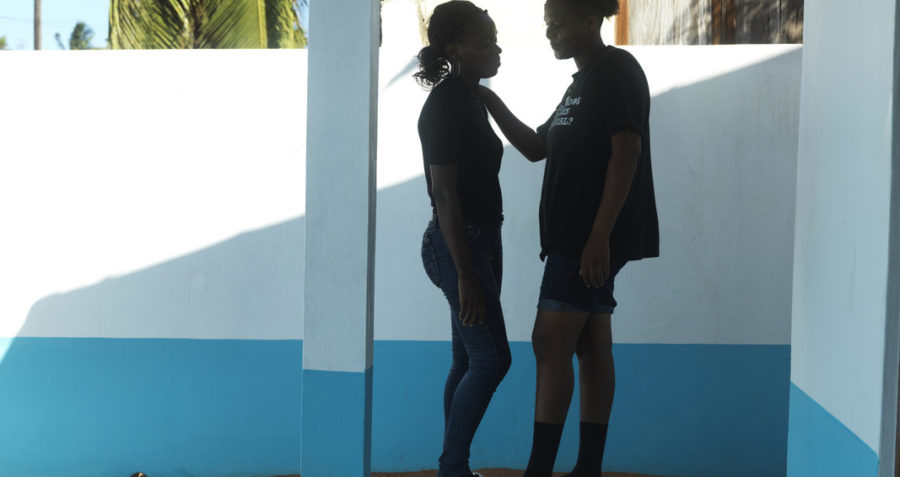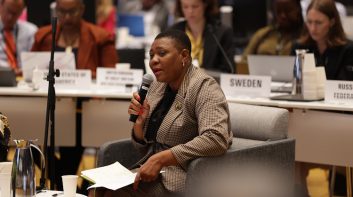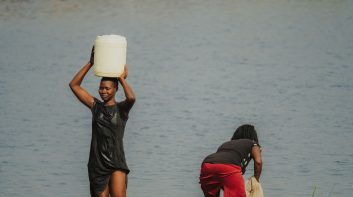Innovation and peer support create change for LGBT people in Mozambique
 © Frontline AIDS/Peter Caton 2019
© Frontline AIDS/Peter Caton 2019
In Mozambique, lesbian, gay, bisexual and transgender (LGBT) people face deeply entrenched social stigma and discrimination. This stops many LGBT people accessing HIV and other health services.
It is particularly dangerous for LGBT people to face barriers to sexual and reproductive health services as they are at higher risk of sexually transmitted infections (STI). This is for numerous complex reasons, including a lack of access to sexual health education and STI prevention. But a programme led by and for LGBT people has now helped thousands to access vital services and information. This was done by blending a range of proven initiatives, such as mobile clinics and peer outreach, with other innovative ideas such as LGBT ‘safe spaces’.
“The project is everything. It changed my life a lot,” says 22-year-old Sofia Cecílio from Cabo Delgado in Mozambique, who became involved in the Deep Engagement programme in 2018.
Sofia says it is through the programme that she first came to hear a term that chimed with her own sexuality. “Since I was a child I realised I liked women. But I didn’t know that there was such a thing as a lesbian in the world,” says Sophia. “In my family, few understand me. Many say, there is no such thing as a lesbian.”
Meeting needs
The Deep Engagement programme began in Mozambique in 2017, operating in the provinces of Cabo Delgado, Maputo and Nampula. It is tailored to meet the needs of LGBT people and has improved their access to prevention, care and treatment services and information for HIV and other sexually transmitted infections. The programme is implemented by LGBT-led organisation LAMBDA (the Mozambican Association for Sexual Minorities), AMODEFA (the Associação Moçambicana Para o Desenvolvimento da Família), Frontline AIDS and Health Gap.
Sophia’s friend Lúcia, a Deep Engagement peer educator, put her in touch with the project. “I wanted to understand more about what was happening to me,” Sophia says.
“At the time, there was no place to seek information about what I was feeling.”
The programme, which came to a close in April 2020, had two clear aims: support LGBT people who are HIV negative remain so and support those living with HIV to access effective treatment and care.
By the time Deep Engagement finished more than 20,000 LGBT people had accessed at least two tailored packages of HIV and other STI prevention and treatment.
The power of peers
Central to the programme were peer educators, well-respected and connected people from the LGBT community, who introduced other LGBT people to the project and linked them to information and services.
Programme partners trained a group of peer educators to carry out rapid HIV tests and provide pre- and post-test counselling for LGBT people, many of whom feel uncomfortable getting tested in public clinics. People with a positive result would be offered the option of being accompanied by a peer to an LGBT-friendly clinic for a confirmatory diagnosis and to access HIV medication. Peers also supported people to stay on treatment.
This innovation was hugely successful. Almost two-thirds of all tests conducted during the programme were carried out by LGBT peer educators. A programme evaluation found that participants who were tested by peers were more likely to access clinical services and start HIV treatment than those testing through healthcare providers.
Encouraged by these results, LAMBDA has adopted the same approach in all their programmes for men who have sex with men.
Safe spaces
To further improve access, the programme also ran mobile clinics in places where LGBT people regularly visited. Here, people could access a range of clinical services, such as STI testing and treatment, delivered by friendly health workers, supported by peers.
Safe spaces, such as drop-in centres, also operated. These spaces provided somewhere for LGBT Mozambicans to socialise, find acceptance and access information and support, either in groups or one-to-one with peers.
“There is a lady who does the health part and I feel welcome,” says Sophia of one such space. “Most people do not go to health services out of fear.
“The only place I can come is here; this is my family. Here I feel good.”
The Mozambique Deep Engagement Grant was funded by the Elton John AIDS Foundation.
Further Reading
Tags
AdolescentsDeep Engagement MozambiqueInnovationLGBTPeer supportStigma and discriminationYoung people





